moorepants
I had heard about Maya Pedal a few years ago when I began human powered machines research and wanted to travel to Guatemala to work with the group. I decided to go the summer of 2007. I spent about one month there working as a volunteer. Guatemala was a beautiful country and the Maya Pedal group is such an awesome place to work and hang out. It is located in the small city of San Andrés Itzapa. San Andrés has a population just over 30,000 and is nestled in the volcanic highlands of the southwest side of the country. Here is a little about what I did while I was there.
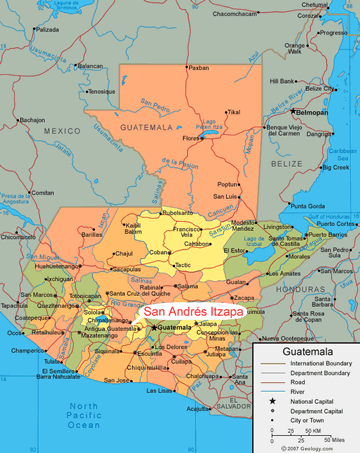 |
Maya Pedal is a non-profit organization that was started in 1997 with the help of of a group from Vancouver called Pedal Power. The organization has since become a Guatemalan run organization and supports itself through donations from Guatemala and abroad. Pedal Power still helps with volunteer coordination and Bike Not Bombs from Boston helps supply Maya Pedal with surplus bicycles from the United States. The organization seeks to promote the use of bicycles and bicycle machines as a mean for development in Guatemala. |
| The shop is located up the street from the town square on a steep hill. It is a two story building with usable roof. The front of the building has been adorned with some great murals, one of a bicycle and the other of a women using the most popular machine that is sold at Maya Pedal. The doors open to the main shop area where the fabrication and repair are done. The first floor also houses two storage rooms for parts, an office space, bathroom, kitchen, and dining room. Most of the second floor is made up of the bicycle show room and volunteer sleeping quarters. The roof is used for bicycle storage and provides a fantastic view of the town and valley below. |  |
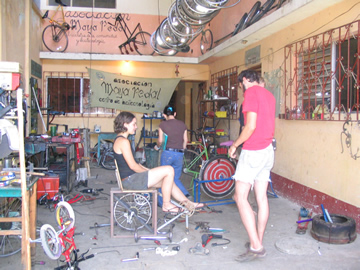 |
The main shop is equipped with a chop saw, arc welder, drill press and a few handheld power tools. A mostly complete set of bike tools are available and many other hand tools. Rachel and I are working on a corn de-kernler/grinder while Johanna makes her way to the office. |
| Gavin, one of the other volunteers, and I explored the hills behind city one afternoon and we were quite suprised to find one of Maya Pedal's machines setup in a squash field underneath a giant avocado tree. The pedal water pump uses wooden plugs attached to a rope to force water through a pvc pipe. It can supposedly pump from depths of up to 30 meters. Maya Pedal manufactures about 15 different pedal powered machines. Some of the more popular ones are the corn dekerneler/grinder, the water pump, and the blender. | 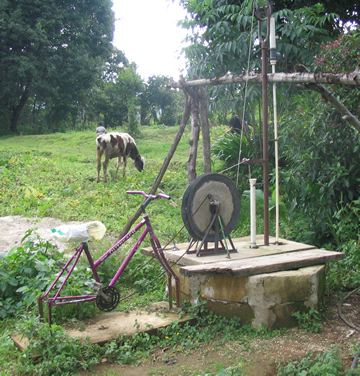 |
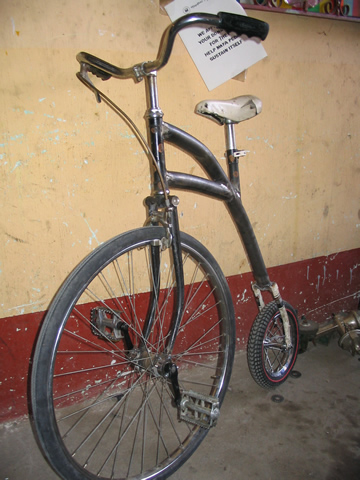 |
One of the first projects we worked on after I arrived was a custom mini penny farthing. A student from the technical school in Chimaltenango came by and requested the bike for something that he was going to do at school. This was one of the only projects that I got to work with Carlos, the head technician at Maya Pedal, on before he left for the states for a conference. We bent the tube for the frame by taking it outside and wedging it between an electrical post and the wall of the neighbors house. The hub is a custom unicycle style hub made from the housing of a coaster brake hub, some large washers, and a crank axle. It turned out good except that it was impossible to remove the spokes after we welded the axle in. |
| The tool boards at the shop were in need of some sprucing up. Most of the outlines were worn away and a lot of the tools didn't have a home. Because of this most of the tools were cluttering the work benches and were easily misplaced around the shop. So we took down all the boards, collected all the tools around the shop and refinished them. The paint we purchased was of poor quality and hardly stuck to the boards, but ended up working out ok. We even tried to label most of the tools, but didn't have any Spanish speakers on hand that knew all the proper names, so we pieced together the best transaltions we could. Some of them were obviously incorrect and even rather amusing, like Llaves de Los Monos. |  |
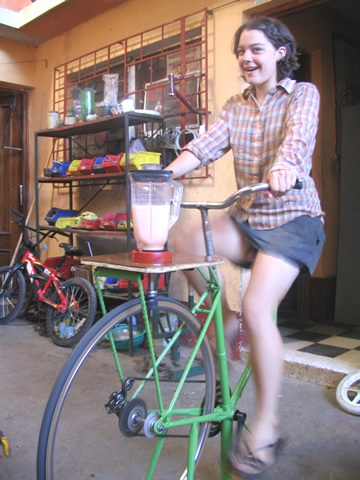 |
Rachel is blending up a smoothie for dinner on a bicycle blender that we fabricated. After we sold the one blender we had in house, Gavin whipped up one in no time. The blender was probably our favorite machine and we came up with many great smoothie recipes. The design is pretty simple and this machine is one of the quickest to fabricate. It uses a single bicycle frame and one piece of rebar. The blender shaft is a converted bike hub with a rubber wheel on one side that engages the side of the tire on the full size wheel. We were able to blend all kinds of fruits and veggies with ease. |
| One of the other machines that we fabricated was the basic corn de-kerneler and grinder. This is the most popular machine and it is capable of saving time over traditional methods of pounding corn into masa. The machine has a recumbent style seating position and an attachment for both processes. The corn dekerneler is a readily available hand cranked machine that is used throughout the world. We romve the hand crank and attache a bicycle cog to the drive shaft. The grinder is also a converted hand cranked machine. We had tons of trouble with chain alignment on the machine but finally got it working smoothly. |  |
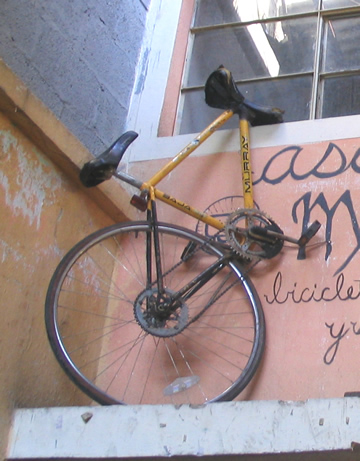 |
We also built some machines for our own entertainment. Gavin was a long time unicycler and I had just recently learned how to ride, so we decided to try to make a giraffe unicycle. We placed the seat on the head tube of the biek frame to save time and it made it very awkward to ride. I never successfully rode it anywhere but Gavin was able to do it and put on a show for the neighbors. |
| We spent the part of one day making bicycle bar stools to go with the bar on the roof. The bar is supported by bike forks and each of our stools were unique. This was a pleasant place to eat and watch the goings on in the city. |  |
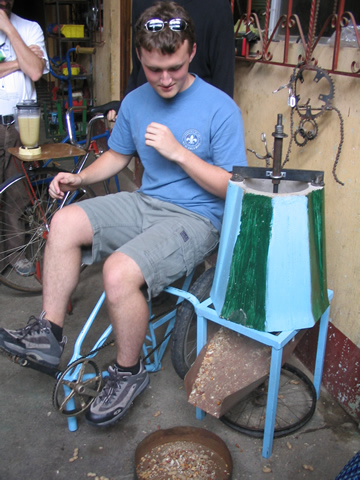 |
Xela Teco is another appropriate technology center in Guatemala that is operated out of Xela. They design and manufacture biodigesters, solar showers, windmills, etc for development in Guatemala. They also treat high school students to tours of the country through educational field trips about appropriate technology. A group of students arrived from Boston one day and we demonstrated our machines. This student is shelling peanuts with the newest product from Maya Pedal. Carlos and Gavin adapted the Full Belly Project's peanut sheller to use pedal power instead of a hand crank. The machine did a great job at shelling the peanuts but a sorting method for the shells and nuts has yet to be worked out. |
| One group of women in San Andrés Itzapa works as a collective to raise money for their families and a reforstation project. We joined the Xela Teco tour and the women showed us how they use organically grown aloe and the Maya Pedal bike blender to make shampoo. They then sell the shampoo on market days to raise money. The women are indigenous and are seen wearing the typical clothing of the region. | 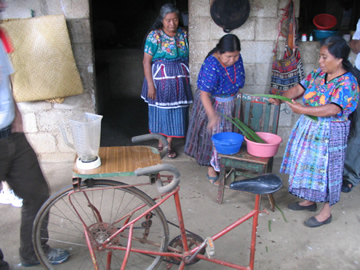 |